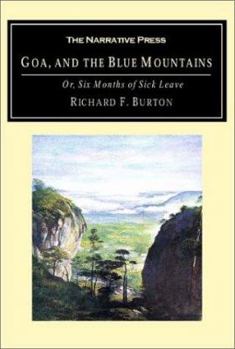Goa, and the Blue Mountains: Or, Six Months of Sick Leave
Select Format
Select Condition 
Book Overview
Complete and unabridged paperback edition.First published in 1951. This description may be from another edition of this product.
Format:Paperback
Language:English
ISBN:1589760387
ISBN13:9781589760387
Release Date:June 2001
Publisher:Stackpole Books
Length:255 Pages
Weight:0.80 lbs.
Dimensions:0.6" x 5.5" x 8.5"
Customer Reviews
1 rating
In Goa, History Speaks to Burton
Published by Thriftbooks.com User , 22 years ago
What could be better than Victorian travel literature by Richard F. Burton. Not much. Burton is no slouch when it comes to travel, he takes the hard routes across his continents not the comfy ones that his fellows take and so he sees more and is better able to put the "normal" English experience of India into a wider context. Burton is never given the tasks or assignments he had hoped to get so he sets himself the task, out of mere boredom perhaps, of categorically describing India, its geography, ethnography, religions. He describes India in all manner of ways of describing a place including history of its cities and Goa's history is quite ripe with meaning for Burton as it tells the story of why the Portugese empire fell..., a tale which Burton feels has a lesson for the English. That he was an expert linguist helps and that he had an appetite, insatiable apparently, for all kinds of experience makes his book a kind of interdisciplinary collection of datas, some more significant than others but the effect is that he experienced a place in every way imaginable. He was romantic in that he was not suited to live within anyones boundaries but his own(he was expelled from Oxford), and scholarly, but his was a kind of scholarship that tested existing knowledge of India in the field. Perhaps a growing disillusion with England & what it really was to be English made him particularly susceptible to other knowledges and ways of being. He learned an immense amount about the lives of various natives by blending in and acting as one of them but he did this much as a spy does this, as a means of gaining information, not as an end in itself. He was perfectly suited to be a spy. Properly used someone like Burton would have been an invaluable source of information as to what actual Indians thought. If there were more like him the empire would have better understood the country it was ruling over and so more effectively ruled it, however, most Englishman felt it best to erect and enforce an invisible boundary between himself and the cultures of India. And Burton, who often dressed according to local custom even in his English quarters, was not popular among his peers nor was his information ever taken very seriously. His commanding officers simply were unable to see the value in his ability to play so many roles and so were unable to give him a role worthy of him to play. Among his narrow minded fellow officers he became his own man, a self-styled cultural anthropologist with a minor disciplinary interest in ethnographic mimicry who filled volumes with his very rare and particular talents for cross-cultural interaction and observation.Like many travel narratives the highlights are in the little details(uncomfortable transports, unfriendly hosts) and side stories. No detail is ever lost on Burton and in matters of stories what counts most is the personality of their teller. There is none better than Burton.





